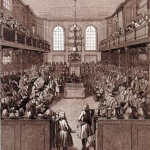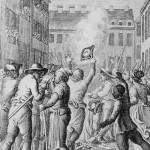Articles tagged with: Stamp Act economic causes
British Taxation in Colonial America, Stamp Act »

Up until the attempt to collect the Stamp duty colonists had accepted minor duties on trade such as the , and even the . cost more to administer than it collected in revenue. Those measures were not considered as “tax” by the colonial assemblies but as trade regulations that compensated for protection, access to foreign products and a foreign market for American goods.
Colonists were careful to draw distinction between internal and external taxes. Internal taxes were those imposed by the provincial government, members of which were elected by residents, …
British Taxation in Colonial America, Timeline of British Acts on America »

During the early seventeenth century Britain created a mercantile system to maintain close control and regulate trade of its colonies, they tried to make sure all revenues generated from the trade with its American colonies went back to the crown. This system did not allow its colonies to freely trade with other countries other than Britain. The first of its protective measures was the The law was designed to protect British economic interests in colonial trade and to protect its industry against the rapidly growing Dutch navigation trade, it …
Stamp Act, Timeline of British Acts on America »

What was the Stamp Act?
The Stamp Act was a tax imposed by the British government on the American colonies. British taxpayers already paid a stamp tax and Massachusetts briefly experimented with a similar law, but the Stamp Act imposed on colonial residents went further than the existing ones. The primary goal was to raise money needed for military defenses of the colonies.
This legislative act was initiated by the British prime minister and adopted by the British Parliament. The decision was taken on March 1765 but did not take effect until …



